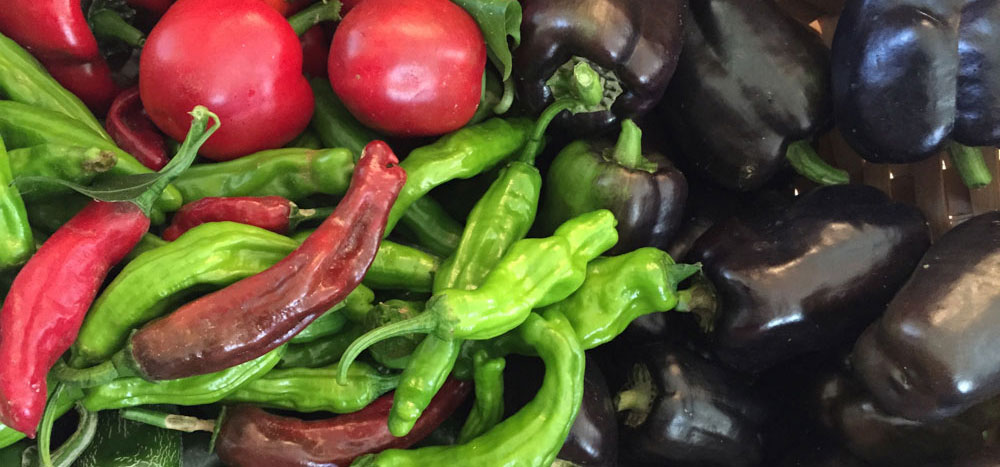[vc_row row_type=”row” use_row_as_full_screen_section=”no” type=”full_width” text_align=”left” css_animation=”” box_shadow_on_row=”no”][vc_column][vc_column_text]Many people who are paying more attention to the foods they eat and the sources of these foods are aware of the Environmental Working Group’s dirty dozen. This is a list of foods that you should certainly buy organic if you choose to eat them. These are the fruits and vegetables that have been found to have the greatest amount of pesticide residue. Well, my analysis goes a bit further to what may be called the organic dirty baker’s dozen plus one!
We all have heard, and hopefully by now know, that eating your fruits and veggies is the key to health and longevity. There has been growing concern, however, on the use of pesticides, herbicides and fungicides on the conventionally grown produce and how that may impact our health. Choosing organic when selecting your produce, is one way to avoid exposing yourself and your family to potentially harmful chemicals, especially from the produce list below which includes those that are more likely to be contaminated. The choice to go organic, however, benefits you far more than just pesticide avoidance.
According to John La Puma MD, going organic on these fruits and vegetables may cut your risk of exposure to pesticides by 90%.: This will not only cut your risk to pesticide exposure, it will be healthier overall. According to Dr. La Puma, some organic produce is higher in nutrients than those grown conventionally. Organically grown produce has been found to be higher in cancer fighting antioxidants as well.
Lycopene and flavonoids, for example, are nutrients that have been associated with reduced rates of cancer. According to The Physician’s Committee for Responsible Medicine (of which I am the local representative), lycopene is the bright red pigment found in tomatoes, watermelon and pink grapefruit. Lycopene is in the carotenoid family, but it is actually more powerful. A Harvard University study showed that men who had just two servings of tomato sauce per week had 23% less prostate cancer risk. Men who had 10 servings had 35% reduced risk.
There is substantial evidence to suggest that flavonoids, which are more plentiful in organic than conventional foods, are effective in the fight against illness. Diseases such as cancer, heart disease and age-related neurological dysfunctions such as Parkinson’s disease and Alzheimer’s disease, have been associated with long-term oxidative stress. Flavonoids are plant by-products believed to protect the plant from insects, bacterial and fungal infection and photo-oxidation. Flavonoids work by protecting the cell against damage caused by active oxygen free radicals. Free radicals can cause cancer and are also associated with cardiovascular disease and agerelated nerve cell damage.
Researchers speculate that organic produce may have more flavonoids because plants use flavonoids to defend themselves against pests and diseases. Produce grown with pesticides has less need for flavonoids and thus may produce less of them. However, organically grown produce will need to produce more flavonoids to protect itself from bugs and diseases. In the February 26, 2003 issue of the Journal of Agricultural Food Chemistry, it was stated that according to researchers, supporters of genetically modified foods often deny or ignore this large body of evidence (that organic produce is higher in disease fighting nutrients).
Pay attention to not only your fresh produce, but other foods made from organic fruits and vegetables. Consider condiments which are made from fresh produce too. Ketchup, for example, is a popular condiment that is widely used. Organic ketchup packs three times more lycopene than the regular stuff and almost twice the level of flavonoids. Researchers who recently tested the antioxidant content of corn that had been grown with and without the use of pesticides found that the corn grown without the chemicals had almost 60% more flavonoids compared to the corn grown with pesticides.
Produce Choices You Should Certainly Buy Organic:
Now I am one to try to support the organic farmer as much as possible with all of my food purchase decisions. It is good to know, however, which produce items are more critically important to buy organic. So, make sure you purchase only organic varieties of the produce listed below. According to the Environmental Working Group (EWG), common growing practices make these crops the most likely to contain pesticide residues. This more comprehensive list includes recommended additional items from Dr. Andew Weil and Dr. John La Puma.
- Peaches
- Apples
- Bell Peppers
- Celery
- Nectarines
- Strawberries
- Cherries
- Kale
- Lettuce
- Grapes (Imported)
- Carrots
- Pears
Plus two others recommended by Dr. Andrew Weil and Dr. John La Puma
- Potatoes
- Spinach
The best way to reap the health benefits of fruits and vegetables without exposing yourself to potentially harmful pesticides is to choose organic produce whenever possible, especially those varieties which are more likely to be contaminated. But if organic produce is either too expensive for your budget or is simply not available, the following list may provide some peace of mind. The non-organic varieties of the fruits and vegetables listed below tend to contain the least amount of pesticides.
- Asparagus
- Avocados
- Bananas
- Broccoli
- Cabbage
- Corn (sweet, frozen)
- Kiwi
- Mangos
- Onions
- Pineapples
- Peas (sweet, frozen)
- Eggplant
- Papaya
- Watermelon
- Tomatoes (except see the note above on lycopene content of organics over non)
- Sweet Potatoes
Whether the produce you purchase is organic or conventionally grown, please do remember to always wash them thoroughly before eating to remove any dirt and bacteria.
In summary, fresh organic foods are important not only for what they give you, higher levels of antioxidants and nutrients, but also for what they don’t give you… exposure to pesticides, herbicides, and non-organic fertilizers.[/vc_column_text][/vc_column][/vc_row]

